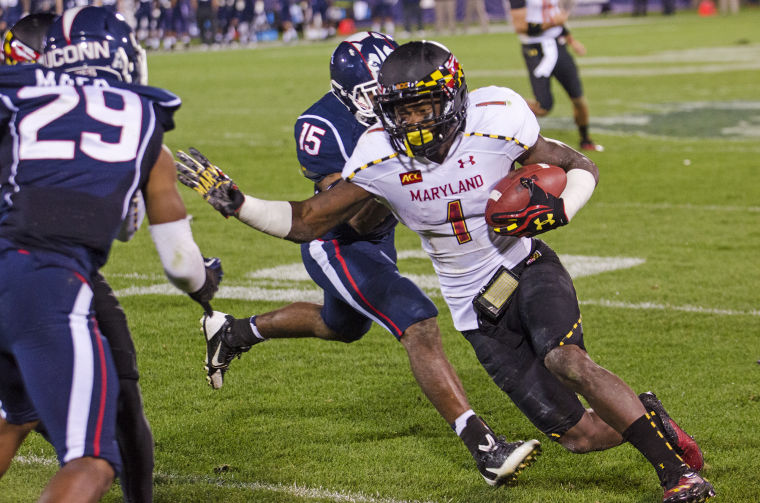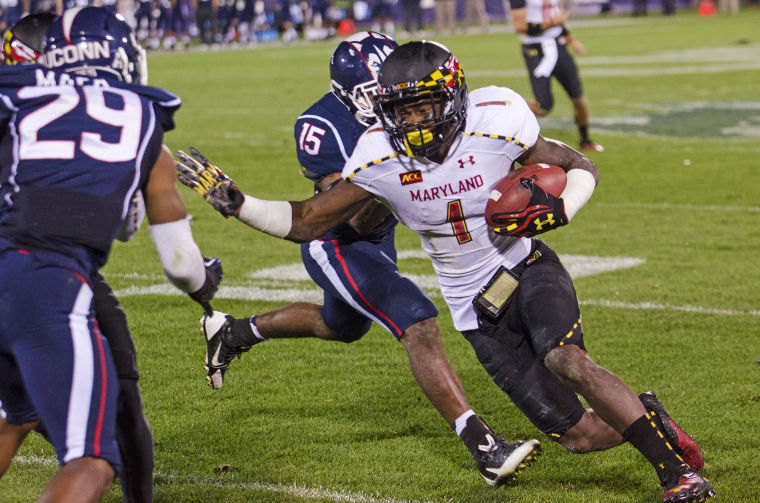In its first road game of the season, the Terrapins football team faced its stiffest challenge yet with coach Randy Edsall’s return to Connecticut. Despite going down by a touchdown early and suffering through several key miscues on offense, the Terps pulled out a 32-21 win. Here are some takeaways from the matchup:
1) McDOUGLE’S DAY
The Terps faced adversity Saturday night for the first time this year, but cornerback Dexter McDougle bailed them out several times when things looked shaky.
In the first half, after the Terps offense had stalled and turned the ball over on downs, McDougle made a diving interception to get the ball back. Then, in the second half with the Terps clinging to a seven-point lead, McDougle picked off another pass — his third of the season — moments after Brad Craddock missed a 50-yard field goal.
McDougle returned that one 49 yards for a touchdown and gave the Terps some much-needed insurance.
Several minutes after making his game-changing play, though, McDougle was got hurt. He was helped off the field holding his arm after suffering a shoulder injury.
Edsall said his status is wait and see, but if McDougle is out for any period of time, it’s a big blow. The Terps’ other starting cornerback, Jeremiah Johnson, will be sidelined for about six to seven more weeks after breaking a bone in a toe on his left foot in the season opener.
McDougle had a career game and helped the Terps overcome plenty of struggles Saturday night. Now, the hope is that he’ll be healthy enough to at least try and match that performance again this year.
2) TURNOVERS
The Terps outgained UConn, 501-383, on Saturday night, but failed to pull away because they had three turnovers. Quarterback C.J. Brown threw one interception on a screen pass intended for running Brandon Ross, the Terps had a miscommunication on a zone read play that caused a fumble and backup tailback Albert Reid coughed it up once.
In the Terps’ first two games, they had just one turnover: an interception thrown by backup quarterback Caleb Rowe in garbage time. So the Terps’ miscues are cause for concern, considering the team was crisp and Brown was making solid decisions earlier in the season.
3) OFFENSE IMPRESSES… AGAIN
Though the Terps’ turnovers and their two failed fourth-down attempts kept them from their third straight 40-point game, the team’s offense continued its hot start Saturday night.
The Terps topped 500 yards for the third straight game and were very balanced against the Huskies, with 277 passing yards and 224 rushing yards.
Wide receiver Stefon Diggs hauled in five catches for 110 yards, Brown rushed for 122 yards and threw for 277, and Ross had 95 yards.
So, sure, the Terps had some costly turnovers and drops, but the offense proved it is a legitimate juggernaut Saturday. They faced their toughest challenge of the young season, and they kept on rolling.
4) STRUGGLES IN THE TRENCHES
The Terps’ young starting offensive line has been an uncertainty all year, and it produced mix results in its first real test.
On two fourth-and-short plays in the first half, the Terps tried to run the ball up the middle to keep drives going. But both times, the Terps offensive line failed to push UConn’s defensive front off the line of scrimmage, and the ball carriers were stopped short of the first down marker.
Left guard De’Onte Arnett said this week that the Huskies had a bigger defensive line than either of the Terps’ first two opponents, Florida International or Old Dominion, and it showed Saturday. The Terps offensive line, which starts two sophomores and one freshman, struggled to open up rushing lanes early.
Still, they seemed to do a good job pass protecting and the run game eventually started clicking as the line helped the Terps gain 501 total yards.
The unit is still a work in progress, and it should continue to improve. It’s going to have to, though, considering that the ACC schedule will bring bigger and more talented defensive fronts.
Wide receiver Stefon Diggs pushes into the end zone for a touchdown during the Terps’ 32-21 victory over UConn on Sept. 14, 2013.





